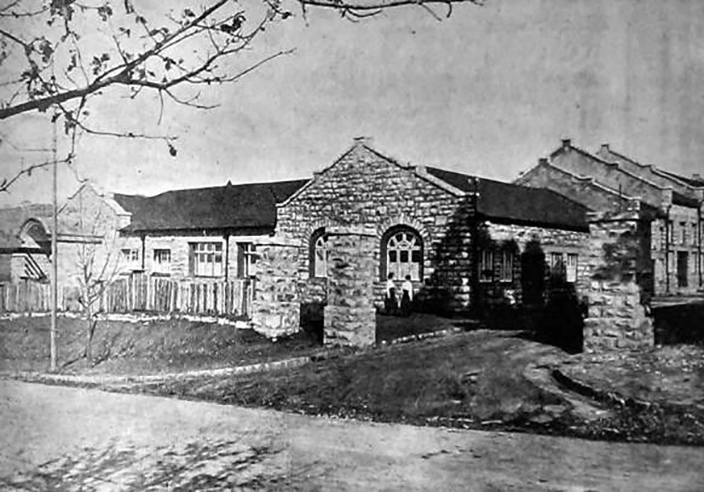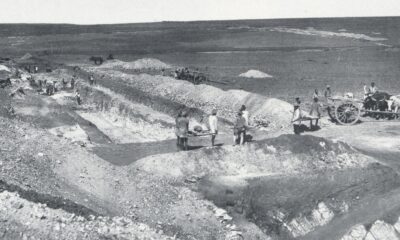
Featured Item

Schlesinger: early Joburg innovator with a ‘kop’ for business
Published
4 years agoon
By
Jordan MosheWhat do amusement parks, fizzy drinks, ice cream, women’s makeup, and the suburb of Killarney have in common? They were all introduced into South Africa by a shrewd, uncouth, and enormously successful Jewish businessman, Isidore William Schlesinger.
The life of this extraordinary individual was outlined in a talk given by veteran journalist Irwin Manoim as part of the Taste of Limmud lecture event held on Saturday, 22 August.
“If you were to take Donald Gordon, add Raymond Ackerman, add to that Sol Kerzner, and then Sammy Marks, you would get a rather irascible and fanatical man by the name of Isidore William Schlesinger,” said Manoim.
Although largely forgotten, Schlesinger loomed large in the early years of 20th century South Africa, when he owned 90 businesses, employed 120 000 staff, and farmed a million orange trees. In fact, his achievements were so great that the only person to attempt a biography of him died on the job. He left a lasting mark on the country as we know it today.
“Schlesinger is one of many Jewish immigrants who arrived in Johannesburg dirt poor and, in a single generation, became prosperous,” said Manoim. “Antisemites would say he, like other Jews, rose to the top through cheating. Jews would say he was born with a kop for business. The fact is that he just happened to arrive in the right place at the right time.”
Schlesinger’s luck was partly the result of opportunities afforded by 20th century innovation and mass consumption, a time when a growing middle class had enough spare cash to buy cheaper goods. Mass markets were left wide open by the Anglo-dominated market, which aimed to provide high-end goods to the wealthier classes only.
“The people who first took notice of this in South Africa were immigrant Jews because they were the outsiders,” said Manoim. “It was second nature to them to look for opportunities where the more powerful didn’t deign to pay attention. Schlesinger’s career illustrates this.”
Born in New York in 1871, Schlesinger left his home at 23, leaving his mother a note that he wouldn’t return until he was a millionaire. He arrived in Johannesburg eight years after its establishment, and found a job selling the new-fangled invention, chewing gum, a product whose virtues South Africans couldn’t be persuaded about.
“The shop owner told Schlesinger that if he could sell the gum, he could sell anything,” said Manoim. “He departed laden with boxes of Beeman’s Pepsin gum, and two weeks later, he had sold the lot.
“He set a precedent. Isidore Schlesinger would become a multimillionaire by persuading reluctant South Africans to adopt American goods and culture over the course of his lifetime.”
Schlesinger quickly moved into insurance, becoming the most successful salesman of policies in the country by going from farm to farm to seek out clients instead of trying his luck in the wealthier suburbs of Johannesburg.
After the Boer War, he founded a property company which effectively established the suburbs of Orange Grove, Parkhurst, and Parkmore, and which encouraged the less affluent to invest in property by changing the typical practice of upfront payment.
It was also thanks to Schlesinger that Killarney came into existence, said Manoim.
“He fell in love with a stretch of land outside town which the owner, a Mr Cook, wouldn’t sell,” he said. “Finally, Cook demanded a sum of £60 000, assuming Schlesinger would turn it down because it was outrageous.
“Schlesinger accepted it. People thought him mad buying a stretch of vacant land outside town. He named it Killarney.”
In spite of his love for Killarney, Schlesinger lived at the Carlton Hotel on Commissioner Street, occupying an entire floor of 18 rooms. From this space, he conducted his business, terrorised staff, and continued to innovate.
“He was sparing with compliments, and never known to say thanks,” said Manoim. “He made no effort to engage with the Jewish community, largely of Litvack origin, and one which he had little in common with. He never lived among them, but did give generously to Arcadia and the Sandringham Jewish Aged Home.”
In 1914, Schlesinger entered the entertainment industry when Barclays Bank persuaded him to take over Johannesburg’s Empire Theatre, the first in the country to screen movies in 1896. He agreed, soon realising that he’d bought a disaster which couldn’t make money.
“Anyone else would have bailed out,” said Manoim. “But Schlesinger went on to buy all South African theatres and the international rights to screen films exclusively in his cinemas. He launched a magazine promoting his cinemas, bought an advertising agency, and introduced advertising in films.”
Schlesinger also produced his own films, shooting at a studio he built in Killarney where dozens of films were produced, including the famed title dramatising the Great Trek, De Voortrekkers. Fifty years later, his son would demolish this studio and replace it with the Killarney Mall.
Another masterstroke attributable to Schlesinger is the transformation of radio from a crude system of wires into a viable mass media platform. In 1927, South Africa had only three stations with a modest following, and no one could figure out how to make money from the service. Schlesinger changed that, buying all three stations, securing the government broadcasting licence for 10 years, and forming the African Broadcasting Company (later the South African Broadcasting Corporation).
Schlesinger reformed radio programming, adding children’s shows, quizzes, news coverage, and more. “He changed the culture,” said Manoim. “Radio became a status symbol, a wooden case replacing the fireplace as a centre point of the lounge. Staying at home to listen to radio became an acceptable form of entertainment.”
Schlesinger continued to trailblaze across various industries over the decades. After a stint in newspapers, he modernised the Carlton Hotel (introducing novelties like telephones, en-suite bathrooms, and Johannesburg’s first escalator), opened the first fast food takeaway, and American-style drugstore, and donated to Johannesburg its first traffic light.
Although Schlesinger died in 1949, his legacy certainly lives on.
“He refashioned central Johannesburg,” said Manoim. “He took it from rather staid Edwardian to copycat Manhattan skyscrapers.
“He wasn’t a man of refined taste, and introduced an eclectic mix of styles in central Johannesburg. He basically prefigured the architectural trickery of later hotel showman Sol Kerzner.”











Nicholas Alexander
Oct 20, 2022 at 3:57 pm
My grandfather was a long standing member found a certificate for 1938 to 1963 Mr N Alexander